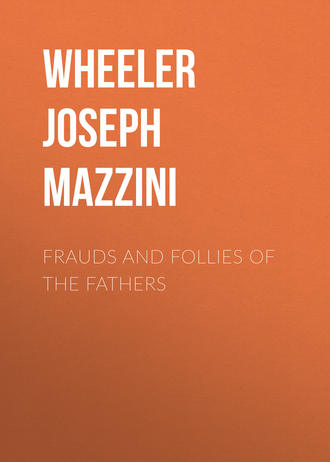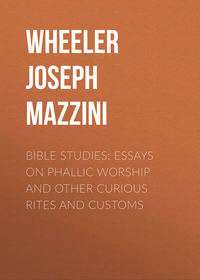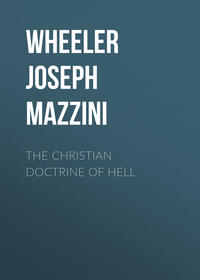 полная версия
полная версияFrauds and Follies of the Fathers
Gibbon, in his sixteenth chapter, says: "The gravest of the ecclesiastical historians, Eusebius himself, indirectly confesses that he has related whatever might redound to the glory, and that he has suppressed all that could tend to the disgrace of religion. Such an acknowledgment will naturally excite a suspicion that a writer who has so openly violated one of the fundamental laws of history has not paid a very strict regard to the observance of the other; and the suspicion will derive additional credit from the character of Eusebius, which was less tinctured with credulity, and more practised in the arts of courts than that of almost any of his contemporaries."7 "No one," says Scaliger, "has contributed more to Christian history, and no one has committed more mistakes." C. B. Waite, ("History of the Christian Religion," p. 28) goes further and says: "Not only the most unblushing falsehoods, but literary forgeries of the vilest character darken the pages of his apologetic and historical writings." G. Reber (p. 104) says: "If we except Irenæus, no writer has so studiously put himself to work to impose falsehoods on the world as Eusebius."
Constantine said of him that he ought not only to be bishop of Cæsarea, but bishop of the whole world. In his life of that emperor he amply repays the flattery. That work is not an history but an extravagant rhetorical panegyric upon the man who murdered his son Crispus, his nephew Licinius, suffocated his wife Fausta, and who, to revenge a pasquinade, was with difficulty restrained from the massacre of Rome, and who used the altar of the Church, which promised absolution and offered atonement for all sins, as a convenient footstool to the throne of the empire. In regard to Constantine's murders, Gibbon says (chap, xxviii.): "The courtly bishop who has celebrated in an elaborate work the virtues and piety of his hero, observes a prudent silence on the subject of these tragic events."
He makes Constantine to have been converted by the miraculous appearance of a cross in the sky. It is a great question if his account of his baptism is correct or if he was baptised in Rome by Pope Sylvester. Indeed, it is a question if Constantine was anything but a Pagan at heart until the end of his days.
The title of the thirty-first chapter of Eusebius's twelfth book of "Evangelical Preparation," is a caution. It reads "That falsehood, may be employed by way of medicine for those who need it." He ascribes to Porphyry (a learned Pagan who had written against Christianity, but whose works were destroyed by order of Theodosius) a forgery of his own time, called "The Philosophy of Oracles," and then cites it as evidence for Christianity. He gives a forged passage ascribed to Phlegon, where that Pagan is made to speak of the darkness which happened at the death of Jesus. If such a passage had been in existence it would have been mentioned by Origen, who refers to Phlegon, but who in his comment on Matthew xxvii., 45, concludes we must not be too positive that he spoke of this darkness in Matthew. He also makes Thallus, another heathen, bear testimony to the eclipse of the sun—another forgery.
At the very outset of his "Ecclesiastical History," he knocks us over with a pretended correspondence which passed between Jesus, who, Jerome says, knew not how to write, and Abgarus, king of Edessa.
This correspondence, wherein Jesus is made to cite the words of the Gospel of John, written probably a hundred years after, long did duty among Christian evidences, but is now given up by every critic of note as a forgery. Addison was one of the last to quote it as genuine.
As it would occupy too much space to follow this Father through all his misstatements, we shall confine our attention to his misrepresentations of Josephus. One of the most notorious of these is the account of the death of Herod Agrippa, grandson of the monster who is supposed to have ordered the slaughter of all the male children in the inland town "Bethlehem, and the coasts thereof," on account of an obscure prophecy. In the 12th chapter of Acts it is stated that Herod, as the people were calling him a god, was smitten by an angel and was eaten by worms. Josephus says: "Agrippa, casting his eyes upward, saw an owl, sitting upon a rope, overhead." Eusebius, in order to make Josephus agree with the Acts of the Apostles, in transcribing the text of Josephus, struck out about the owl and substituted an angel. Lardner says: "I know not what good apology can be made for this." Nor do we, unless that one-winged fowl is just as good as any other.
He makes Josephus' account of Theudas confirmatory of Acts v., 36; while, in fact, it disagrees with that account so much as to give commentators the utmost perplexity. He also, tries to reconcile Josephus with Luke by confounding the taxing in the time of Herod with that after the banishment of Arche-laus, who reigned for nine years after Herod's death. Dr. Lardner's works (vol. i, p. 344) says: "I must confess I ascribe that not to ignorance but to somewhat a great deal worse. It is impossible that a man of Eusebius's acuteness, who had the New Testament and Josephus before him, should think a census made after Archelaus was the same with that before Herod died; but Eusebius was resolved to have St. Luke's history confirmed by the express testimony of the Jewish historian, right or wrong."
Such instances make us suspect Eusebius in regard to the celebrated interpolation in which Josephus is made to give evidence to Jesus as the Christ (Antiq. xviii., hi., 3). He at any rate first cited the forgery, which was unknown to Origen, and distinctly asserts that Josephus did not acknowledge Christ. Dr. Lardner tells us the style of the paragraph is very Christian, if it be not the composition of Eusebius himself, as Tanaquil Faber suspected.
1
"The Apostolical Fathers," chap, i., p. 101, 1874.
2
Pp. 12 and 13, vol i., "Ante-Nicene Christian Library. "All our citations, unless otherwise mentioned, will be taken from this valuable series of volumes.
3
See B. H. Cowper's article on the Talmud, in "The Journal of Sacred Literature," Jan., 1868.
4
"Stromata," book ill-, 9, 13. The English editors have deemed it best to give the whole of this book in Latin.
5
Origen, bk. vii;, 53; p. 475:—The Sibyl was appealed to by Theophilus and other early Christian apologists. The author of "Questiones et Responsiones ad Orthodoxos," a work falsely ascribed to Justin, says that Clement of Rome, in his epistle to the Corinthians, appeals to the writings of the Sibyl. In the present version there is no such allusion.
6
"Irenæus: A Leaf of Primitive Church History Corrected and Re-Written," 1876.
7
Dean Milman, in his Notes to Gibbon, vol. ii., p. 285; 1854, speaks of "the loose and, it must be admitted, by no means scrupulous authority of Eusebius."



